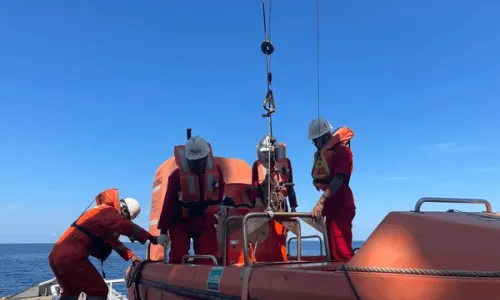Answers For Working as a lifeboat volunteer
Answers and detail explain for Working as a lifeboat volunteer
Explain
Working as a lifeboat volunteer

I never really planned to be a lifeboat volunteer when I came to live in Northsea. I'd been
working in London as a website designer, but although that was interesting, I didn't like city
life. 1I'd been really keen on boats as a teenager, and I thought if I went to live by the sea,
I might be able to pursue that interest a bit more in my free time. Then I found that the
Lifeboat Institution was looking for volunteers, so I decided to apply.
The Lifeboat Institution building here in Northsea's hard to miss, it's one of the largest in the
country. It was built 15 years ago with 2funds provided by a generous member of the public who'd lived here all her life. As the Lifeboat Institution is a charity that relies on that kind of
donation, rather than funding provided by the government, that was a huge help to us.
When I applied, I had to have a health assessment. The doctors were particularly interested
in my vision. I used to be short-sighted, so I'd had to wear glasses, but I'd had laser eye
surgery two years earlier so that was OK. 3They gave me tests for colour blindness and they
thought I might have a problem there, but it turned out I was OK.
When the coastguard gets an alert, all the volunteers are contacted and rush to the lifeboat
station. Our target's to get there in five minutes, then 4we try to get the boat off the dock and
out to sea in another six to eight minutes. Our team's proud that we usually achieve that - the
average time across the country's eight and a half minutes.
I've recently qualified as what's called a 'helmsman', which means I have the ultimate
responsibility for the lifeboat. I have to check that the equipment we use is in working order -
the crew have special life jackets that can support up to four people in the water. And
5it's ultimately my decision whether it's safe to launch the boat. But it's very rare not to launch
it, even in the worst weather.
As well as going out on the lifeboat, my work involves other things too. A lot of people
underestimate how quickly conditions can change at sea, so 6I speak to youth groups and
sailing clubs in the area about the sorts of problems that sailors and swimmers can have if
the weather suddenly gets bad. We also have a lot of volunteers who organise activities to
raise money for us, and we couldn't manage without them.
The training we get is a continuous process, focusing on technical competence and safe
handling techniques, and 7-8it's given me the confidence to deal with extreme situations without
panicking. I was glad I'd done a first aid course before I started, as that's a big help with the
casualty care activities we do. We've done a lot on how to deal with ropes and tie knots -
that's an essential skill. After a year, I did a one-week residential course, led by specialists.
They had a wave-tank where they could create extreme weather conditions - so 7-8we could get
experience at what to do if the boat turned over in a storm at night, for example.
Since I started, I've had to deal with a range of emergency situations.
But the work's hugely motivating. It's not just about saving lives - I've learned a lot about the
technology involved. My background in IT's been useful here, and I can use my expertise to
help other volunteers. 9-10They're a great group - we're like a family really, which helps when
you're dragging yourself out of bed on a cold stormy night. But actually, 9-10it's the colder months
that can be the most rewarding time. That's when the incidents tend to be more serious, and
you realise that you can make a huge difference to the outcome.
So if any of you listeners are interested....
Questions 1 - 6
Choose the correct letter, A, B or C.
1What made David leave London and move to Northsea?
A.
B.
C.
2The Lifeboat Institution in Northsea was built with money provided by
A.
B.
C.
3In his health assessment, the doctor was concerned about the fact that David
A.
B.
C.
4After arriving at the lifeboat station, they aim to launch the boat within
A.
B.
C.
5As a 'helmsman', David has the responsibility of deciding
A.
B.
C.
6As well as going out on the lifeboat, David
A.
B.
C.
Questions 7 and 8:
Choose TWO letters, A-E.
Which TWO things does David say about the lifeboat volunteer training?
A.
B.
C.
D.
E.
Questions 9 - 10:
Choose TWO letters, A-E.
Which TWO things does David find most motivating about the work he does?
A.
B.
C.
D.
E.
![[Forecast Q2-2025] - Biology lecture](https://static.helik.app/reading/8fd3d7d2-ccf9-47a3-8920-2e7a3b0d6607)
![[Forecast Q2-2025] - Living in the City](https://static.helik.app/reading/1a60bcf3-f3a7-4e9b-97a2-94d156a0de3b)
![[Forecast Q2-2025] - Student Union](https://static.helik.app/reading/fb443123-8c1d-447e-8c79-5a01650f4754)
![[Forecast Q2-2025] - Fruit-picking Job in an Orchard](https://static.helik.app/reading/e1968346-6c55-44ae-b8d3-f6a4fb7207b9)
![[Forecast Q2-2025] - University Crime Prevention](https://static.helik.app/reading/bdda593e-16d6-4c72-8a12-b116e917b27c)
![[Forecast Q2-2025] - Business Course](https://static.helik.app/reading/3308e282-99a6-4bcb-9d22-0b488701d968)
![[C20T1] - Choosing a restaurant](https://static.helik.app/reading/e9b21123-c43c-42fb-88b7-5d0be3a37e03)
